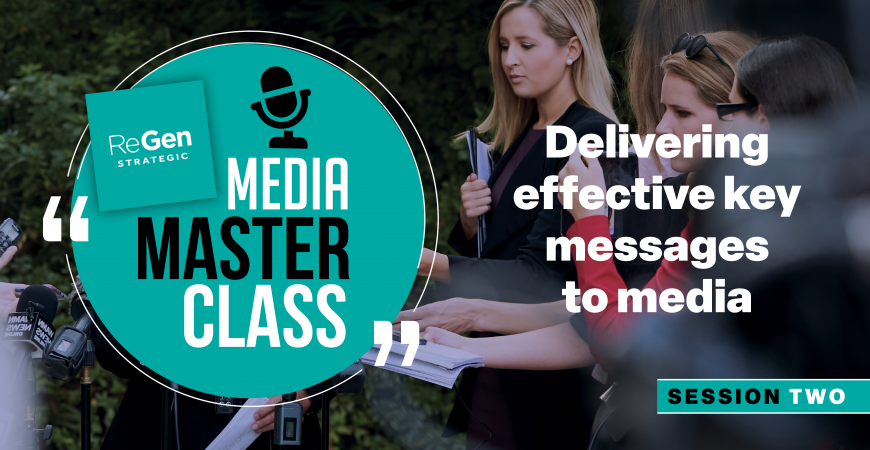We’ve all watched those media interviews on TV with politicians who constantly repeat themselves and never actually answer any of the questions.
As a viewer, it can be incredibly frustrating, and it seems many interviewees don’t know (or don’t care) about the difference between ‘staying on message’ and ‘STAYING ON MESSAGE’.
The latter may actually be an important tactic in a controversial situation, but it can make both the media and the audience think the person being interviewed has got something to hide.
There’s no doubt that before any kind of interview with any type of media, your media relations strategy should include developing some key messages to help you stay on track and get your point across.
Key message development is one of the key pillars of ReGen Strategic’s media training, during which we work with clients to draft and refine key messages for media interviews.
Although feedback from our team of former journalists will yield the best results, there are some key takeaways that can be applied anytime.
How to develop key messages
Start by writing down up to five succinct bullet points, which helps you to focus on what you want to say, then you can refine how you want to say it.
Key messages should be short and sharp and easily understood by an audience – no more than two or three sentences.
Use language that is strong, will grab attention and be easily remembered by your target audience, but ensure the overall message is something people can relate to or sympathise with.
If applicable, use hard-hitting statistics but limit them so you don’t confuse people – and make sure they are accurate and can be verified.
Tailor your messages to your target audience and avoid jargon (you might be accustomed to using certain acronyms, but it doesn’t mean the audience is familiar with them, and they’ll switch off if they don’t know what you’re talking about).
This last point is particularly important if you’re speaking about topics that are not well understood by the general public or are still new and complex, like sustainability and ESG, for example.
If you’re a sustainability expert presenting at a conference of your peers, it’s fine to use industry terms like taxonomy, materiality and supply chain decarbonisation or acronyms like ISSB or GRI – but they have no place in key messages for a general media audience.
Practise your key message
Once you have your key messages, it’s worthwhile practising them out loud (in an interview, you won’t be reading them to yourself inside your head).
It’s also a good idea to think about the kinds of questions you could get asked in an interview, and how you can weave your key messages into the answers.
During our media training program, we run simulated media interviews for radio and TV to provide an opportunity to put your key message delivery to the test.
This component of the media training session not only gives you an opportunity to rehearse your key messages, but also allows you to practise using them to answer questions in a press conference environment.
Of course, while key messages are essential in getting across the point you’re trying to make, sticking to them absolutely, and not offering any additional comment does not make for a good interview.
Many interviewees go into an interview knowing that it’s likely to be edited down to a 20 second (or less) soundbite, and so the tendency can be to simply repeat the same key message over and over to ensure it’s included in the final story.
And while that may be the final outcome, the equally likely outcome is that you’ll annoy both the journalist, and potentially the audience, by avoiding the questions.
To receive expert assistance in developing key messages and an opportunity to test delivery in a realistic simulated media interview, contact ReGen Strategic for more information about our bespoke media training program.
 ReGen Strategic
ReGen Strategic